 MORNINGSTAR RANCH
MORNINGSTAR RANCH 
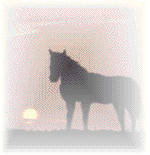
Home | About Us | Chief Morning Star | Info and Poems | Snapshots | Aragorn | Trail Rides | Pricelist / Barnrules | Contact Us
Chief Morning Star
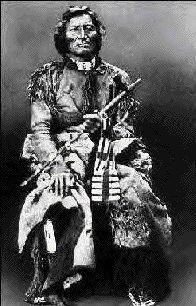
Morning Star, that was his real name, Wohe Hiv, a Cheyenne name.
He is also known as Dull Knife, which was a kidding name, his brother always teased him about the sharpness of his knife, and before long this nickname was how he came to be remembered.
Although he was a member of the Dog Soldier Society, he was most trusted for his wisdom in counsel rather than his abilities as a fighter.
Morning Star was born in the 1820's and died in Montana in 1883, five years after the long treck from Indian Territory, five years after he was among the few who survived the bloody massacre at Fort Robinson that brought to an end his part in the long odyssey.
The first written record of Dull Knife was made in 1856 after soldiers claimed that four horses had been stolen by the Cheyenne's. When Little Wolf refused to give up the horses he had found and the soldiers retaliated by capturing a Cheyenne man, Dull Knife was the one who negotiated with the commander at Fort Laramie for the release of the captive.
That was his first contact with the veho.
The life of Dull Knife, "The Cheyenne," is a true tale of heroism. Simple, child-like yet manful, and devoid of selfish aims, or love of gain, he is a pattern for heroes of any race.
Dull Knife was a chief of the old school. Among all the Indians of the plains, nothing counts save proven worth.
A man's caliber is measured by his courage, unselfishness and intelligence.
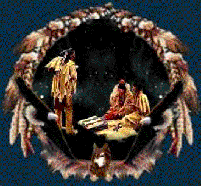
It is said that Dull Knife as a boy was resourceful and self-reliant.
Dull Knife was quite a youth when his tribe was caught one winter in a region devoid of game, and threatened with starvation. The situation was made worse by heavy storms, but he secured help and led a relief party a hundred and fifty miles, carrying bales of dried buffalo meat on pack horses
.
Another exploit that made him dear to his people occurred in battle, when his brother-in-law was severely wounded and left lying where no one on either side dared to approach him. As soon as Dull Knife heard of it he got on a fresh horse, and made so daring a charge that others joined him; thus under cover of their fire he rescued his brother -in-law, and in so doing was wounded twice.
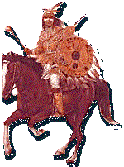
As is well known, the Northern Cheyenne uncompromisingly supported the Sioux in their desperate defense of the Black Hills and Big Horn country.
It was their last buffalo region, their subsistence. It was what our wheat fields are to us.
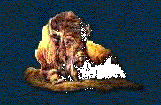
About the year 1875, a propaganda was started for confining all the Indians upon reservations, where they would be practically interned or imprisoned, regardless of their possessions and rights. The men who were the strongest advocates of the scheme generally wanted the Indians' property; the one main cause back of all Indian wars.
From the warlike Apaches to the peaceful Nez Perces, all the tribes of the plains were hunted from place to place; then the government resorted to peace negotiations, but always with an army at hand to co-erce. Once disarmed and helpless, they were to be taken under military guard to the Indian Territory.
A few resisted, and declared they would fight to the death rather than go. Among these were the Sioux, but nearly all the smaller tribes were deported against their wishes. Of course those Indians who came from a mountainous and cold country suffered severely.
The moist heat and malaria decimated the exiles. Chief Joseph of the Nez Perces and Chief Standing Bear of the Poncas appealed to the people of the United States, and finally succeeded in having their bands, or the remnant of them, returned to their own part of the country. Dull Knife was not successful in his plea, and the story of his flight is one of poignant interest.
He was regarded by the authorities as a dangerous man and, with his depleted band, was taken to the Indian Territory without his consent in 1876. When he realized that his people were dying like sheep, he was deeply moved. He called them together. Every man and woman declared that they would rather die in their own country than stay there longer, and they resolved to flee to their northern homes.
Here again was displayed the genius of these people. From the Indian Territory to Dakota is no short dash for freedom. They knew what they were facing. Their line of flight lay through a settled country and they would be closely pursued by the army. No sooner had they started than the telegraph wires sang one song:
"The panther of the Cheyenne is at large. Not a child or a woman in Kansas or Nebraska is safe."
Yet they evaded all the pursuing and intercepting troops and reached their native soil. The strain was terrible, the hardship great, and Dull Knife, like Joseph, was remarkable for his self-restraint in sparing those who came within his power on the way.
But fate was against him, for there were those looking for blood money who betrayed him when he thought he was among friends. His people were tired out and famished when they were surrounded and taken to Fort Robinson. There the men were put in prison, and their wives guarded in camp. They were allowed to visit their men on certain days. Many of them had lost everything; there were but a few who had even one child left.
They were heartbroken.
These despairing women appealed to their husbands to die fighting: their liberty was gone, their homes broken up, and only slavery and gradual extinction in sight. At last Dull Knife listened. He said, "I have lived my life. I am ready." The others agreed. "If our women are willing to die with us, who is there to say no? If we are to do the deeds of men, it rests with you women to bring us our weapons."
As they had been allowed to carry moccasins and other things to the men, so they contrived to take in some guns and knives under this disguise. The plan was to kill the sentinels and run to the nearest natural trench, there to make their last stand. The women and children were to join them.
This arrangement was carried out. Not every brave had a gun, but all had agreed to die together. They fought till their small store of ammunition was exhausted, then exposed their broad chests for a target, and the mothers even held up their little ones to be shot.
Thus died the fighting Cheyenne and their dauntless leader.
A man who met Dull Knife during his trip to Washington wrote this in his diary:
Dull Knife was tall and lithe in form, he had the face of a statesman or a church dignitary of the grave and ascetic type. His manner of speech was earnest and dignified, and his whole bearing was that of a leader with cares of state.

Ma i' you'n, the mysterious power that controlled the affaires of humankind, is silent now.
The bones of Morning Star have returned to dust. The descendants of many of the Cheyenne and of the pioneers and soldiers who died are scattered now far away from the reality of those times, far away from the memory of the stars and heat lighting, the storms and full moon of the long prairie march into time.
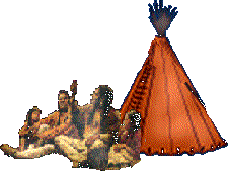
(Cheyenne)
From the mountains we come
lifting our voices for the beautiful
road you have given
we are the buffalo people
we dwell in the light of our father son
in the shadow of our mother earth
we are the beautiful people
we roam the great plains without fear
in our days the land has taught us oneness
we alone breathe with the rivers
we alone hear the song of the stones
oh ghost that follows me
find in me strength to know the wisdom
of this life
take me to the mountain of my grandfather
I have heard him all night
singing among the summer leaves
Great spirit
make me whole
I have come this day with my spirit
I am not afraid
for I have seen in vision
the white buffalo
grazing the frozen field
which grows near the full circle
of this
world
Lance Henson
____________________________________________________________________________________________________________________________
Home | About Us | Chief Morning Star | Info and Poems | Snapshots | Aragorn | Trail Rides | Pricelist / Barnrules | Contact Us